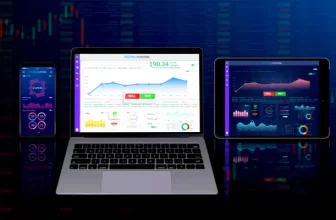
Forex Broker Types: Understanding the Differences Between Dealing Desk and No Dealing Desk Brokers
There are so many forex broker types out there, and understanding what each type does, will help your forex broker section.
In this article, we’ll explore the differences between these two types of brokers and help you decide which one might be right for you.
Table of Contents
- What is a Dealing Desk Broker?
- Advantages and Disadvantages of Dealing Desk Brokers
- What is a No Dealing Desk Broker?
- Advantages and Disadvantages of No Dealing Desk Brokers
- ECN Brokers
- STP Brokers
- DMA Brokers
- Hybrid Brokers
- Conclusion
What is a Dealing Desk Broker?
Market Maker brokers, also known as dealing desk brokers, are the opposite of no dealing desk brokers. They provide liquidity to their clients by taking the opposite side of their trades and make money by charging a spread. Market Maker brokers may also offer fixed spreads and may have a wider range of account types and trading platforms than no dealing desk brokers.
Advantages and Disadvantages of Dealing Desk Brokers
The main advantage of dealing desk brokers is that they provide liquidity to their clients. They are always willing to buy or sell the currency pairs that their clients want to trade, even if there is no other market participant willing to do so. Dealing desk brokers also typically offer fixed spreads, which can make it easier for traders to manage their trading costs.
However, dealing desk brokers have been known to engage in certain practices that can be detrimental to their clients. For example, they may “trade against” their clients by taking the opposite side of their trades and profiting when their clients lose money. This can create a conflict of interest between the broker and their clients. Additionally, dealing desk brokers may sometimes widen their spreads or delay trade executions during periods of high volatility or news events, which can lead to slippage and increased trading costs for clients.
What is a No Dealing Desk Broker?
No dealing desk brokers, as the name suggests, do not operate a dealing desk. Instead, they pass their clients’ trades directly to liquidity providers such as banks or other brokers, who then execute the trades. No dealing desk brokers make money by charging a commission or a markup on the spread provided by their liquidity providers.
Advantages and Disadvantages of No Dealing Desk Brokers
The main advantage of no dealing desk brokers is that they offer their clients access to a deeper pool of liquidity, as they are not limited to their own internal market. This can result in tighter spreads, faster trade executions, and less slippage. No dealing desk brokers do not have a conflict of interest with their clients and are not incentivized to “trade against” them.
However, no dealing desk brokers may charge higher trading costs than dealing desk brokers, as they pass on the spread provided by their liquidity providers, plus a commission or markup.
Additionally, some no dealing desk brokers may have minimum account sizes or require higher minimum deposits, which can make it difficult for smaller traders to get started.
ECN Brokers
Electronic Communication Network (ECN) brokers are a type of no dealing desk broker that connects traders directly to a network of liquidity providers. They provide access to a deeper pool of liquidity and typically offer variable spreads, which can be very low during times of high liquidity. ECN brokers also often offer the ability to trade in large sizes, making them a popular choice for institutional traders.
STP Brokers
Straight Through Processing (STP) brokers are similar to ECN brokers in that they do not operate a dealing desk and instead pass their clients’ trades directly to liquidity providers. However, STP brokers may have fewer liquidity providers than ECN brokers, which can result in wider spreads and less competitive pricing.
DMA Brokers
Direct Market Access (DMA) brokers are similar to ECN and STP brokers in that they provide their clients with direct access to liquidity providers. However, DMA brokers may also offer access to other markets, such as stocks or futures, and typically charge a commission on trades instead of a markup on the spread.
Hybrid Brokers
Hybrid brokers are a combination of dealing desk and no dealing desk brokers. They may offer both fixed and variable spreads, depending on the liquidity of the market, and may operate a dealing desk for certain types of trades while passing others directly to liquidity providers. Hybrid brokers may offer a wider range of account types and trading platforms than either dealing desk or no dealing desk brokers.
Conclusion
Choosing the right forex broker is essential for success in the forex market. Dealing desk and no dealing desk brokers each have their own advantages and disadvantages, and it’s important to consider a range of factors when choosing a broker, including regulatory oversight, spreads and fees.



